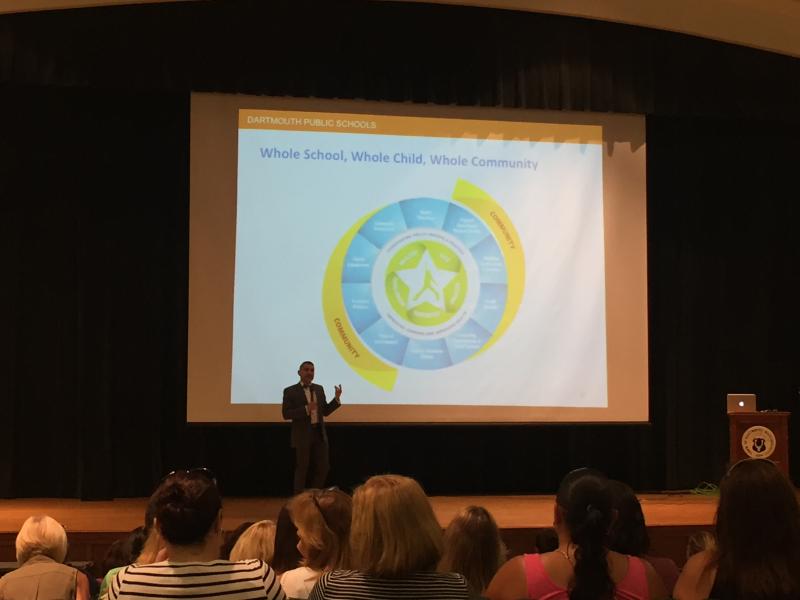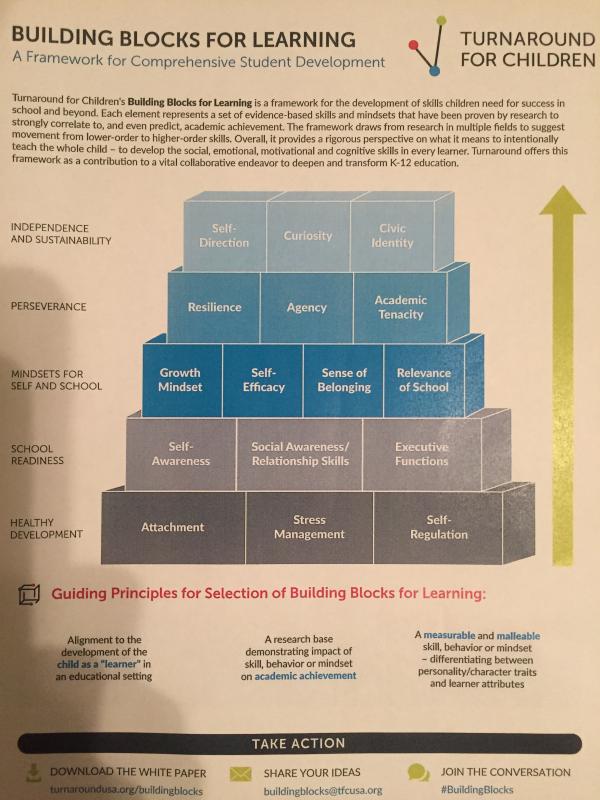Dartmouth Public Schools to prioritize social, emotional health
“What does it mean to support the needs of a whole child?”
That is the question keynote speaker Amalio Nieves asked Dartmouth Public School teachers and administration on August 30. Dartmouth Superintendent Bonny Gifford invited Nieves—who has more than 30 years of experience in education and is currently the Assistant Superintendent of Social and Emotional Learning and Wellness in Boston Public Schools—to talk to her staff as part of her three-year plan to strengthen social and emotional learning in the curriculum.
“I’ll put social/emotional learning ahead of standardized testing any day,” said Gifford.
Nieves illustrated “the ability to learn” as a set of needs; before students can have a mindset for school—including self-efficacy, a sense of belonging, and a growth mindset—students must have low stress levels, be able to regulate their emotions, and know how to be kind to their peers, among other skills, he said.
With constant stressors—including technology and media, single-parent homes, and even the opioid crisis—students aren’t achieving healthy development skills, explained Nieves.
“Social and emotional learning isn’t a ‘nice to have,’ but a ‘must-have,’” Nieves said. He focused his lecture on defining what students need to be focused and engaged, as well as identifying qualities of a safe and supportive environment.
“They need someone to communicate with at home. Technology has taken over people’s lives, and [students] need someone to talk to,” said Quinn Elementary Teacher Patricia Carroll in a group discussion. She also listed nutrition, shelter, and a healthy family life as necessities for stable children.
Nieves agreed, saying that nutrition, family engagement, and even counseling make for healthy children. He extended that though, saying that teachers also need to be happy and healthy in order to foster student success.
“You need to feel safe. You need to be healthy. You need to feel engaged, supported, and challenged,” he said. He compared teaching to securing an oxygen mask on an airplane, in which attendants instruct you to take care of yourself first so that you can more effectively help the people around you.
Gifford called the lecture a success. “It met all of our goals,” she said. “I really like the building block visual.”
Kids have a lot of obstacles, and the tiered visual helps staff understand that students’ basic needs must be met before they can focus on academic success, said Gifford.
DeMello Elementary Teacher Rachel Dyer said she’d recently witnessed the importance of basic health during a visit to Boston Public Schools. She said when the school day ended, several kids appeared in the main office, wrapped in blankets and crying. Administration explained to her that for many of the students, school was their stability because their home life was such a mess.
“Their focus as a school is forming intimate relationships. They’re on the first tier,” said Dyer. The anecdote was worth sharing because many schools jump straight to academic achievement when their students may not be ready for that. Nieves said that social and emotional skills are worth the investment.
“When you focus on social/emotional growth, that doesn’t take away from instructional learning,” said Nieves. Not only does it yield an 11-percent increase in academic achievement, he said, but it also prepares kids for the workforce.
You’re preparing them with knowledge, but we need problem solvers, said Nieves. Employers want candidates who can get along with each other, collaborate on a task, and are persistent, he explained.
“This is an opportunity for us,” he said.
Carroll left the lecture ready to form stronger relationships with her students: “I think what he just said is that you have to build a family relationship. You have to have bonds with your students.”
Dyer set a different goal for herself. She said she would no longer look at at-risk students as “at risk,” but rather, she would play off their strengths to create opportunities for them.
Dyer's takeaway echoed the message in a video Nieves shared, called “The Science of Character.” The eight-minute YouTube video suggested that by encouraging positive characteristics in yourself and in others, you can create a personality change.
For example, by encouraging and even rewarding skills that students already have—including kindness, leadership, and drive—teachers can aid students’ success.
“These skills... this is what the work force is looking for,” said Nieves. “I really commend Dartmouth for embracing this piece,” he said.















